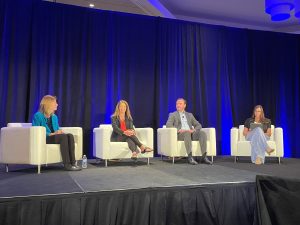As technology continues to transform the healthcare landscape, cybersecurity remains a topic at the forefront. Safeguarding patient data, ensuring the integrity of medical devices, and protecting healthcare systems from cyber threats are paramount concerns for the industry. That’s why I recently attended the HIMSS Cybersecurity Conference, an event that brought together experts, innovators, and thought leaders to delve deep into the world of healthcare security.
The conference started with a thought-provoking keynote session from John Riggi, National Advisor for Cybersecurity and Risk for the AHA, on the evolving cyber threat landscape in healthcare. John shared alarming statistics about the increasing frequency and sophistication of cyberattacks targeting healthcare organizations. The key takeaway was that we must stay one step ahead of cybercriminals to safeguard patient data and maintain the trust of our patients.
The keynote was followed by practical insights; sessions explored best practices fostering a security-driven culture and how to engage in innovation safely and securely. From encryption techniques to secure data-sharing protocols, experts provided actionable strategies to fortify the defenses of healthcare organizations. I was particularly impressed by the emphasis on creating a culture of cybersecurity within healthcare organizations, highlighting the nuances of staff training and awareness. Other sessions also covered the rising risks and opportunities AI and IoT devices offer. Both advancements change the landscape of cybersecurity, adding new considerations to potential threats of bad actors and the solutions to thwart them.
A segment that I found particularly helpful was led by Lee Kim, HIMSS’s senior Principal of Cybersecurity and Privacy. Lee delved into the often-confusing world of healthcare Cyber, AI, and IP regulations. This session was invaluable in distilling some key takeaways and nuances of emerging regulations relevant to healthcare organizations..
 On the second day, I had an amazing opportunity to serve on a panel with Terri Ripley, OrthoVirginia’s CIO, and Margie Zuk, MITRE’s Senior Principal Cybersecurity Engineer. Together, we discussed how the landscape of cybersecurity is changing and how the strategies that worked in the past need to be updated. It was fantastic to have a dialogue with Terri and Margie and hear their first-hand experiences and best practices.
On the second day, I had an amazing opportunity to serve on a panel with Terri Ripley, OrthoVirginia’s CIO, and Margie Zuk, MITRE’s Senior Principal Cybersecurity Engineer. Together, we discussed how the landscape of cybersecurity is changing and how the strategies that worked in the past need to be updated. It was fantastic to have a dialogue with Terri and Margie and hear their first-hand experiences and best practices.
Attending the HIMSS Cybersecurity Conference was an excellent learning experience. It reinforced the critical importance of cybersecurity in healthcare and gave me a wealth of knowledge and practical insights to take back to my organization. The conference provided valuable insights into compliance strategies and privacy-centric technologies, making it clear that a proactive approach is the key to avoiding hefty fines and reputational damage. As we move forward in this digital age, one thing is clear: a proactive and holistic approach to healthcare security is not just a necessity but an ethical obligation to our patients.
If you’re responsible for technology in the healthcare industry, I highly recommend attending future HIMSS cybersecurity conferences to stay on the cutting edge of healthcare security practices and innovations. Together, we can ensure the safety and security of patient data and the resilience of healthcare systems.
To learn more about the ways we help healthcare organization provide exceptional patient experiences, visit us online.





